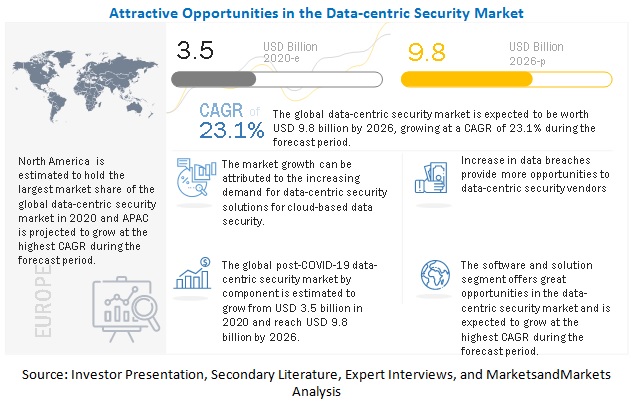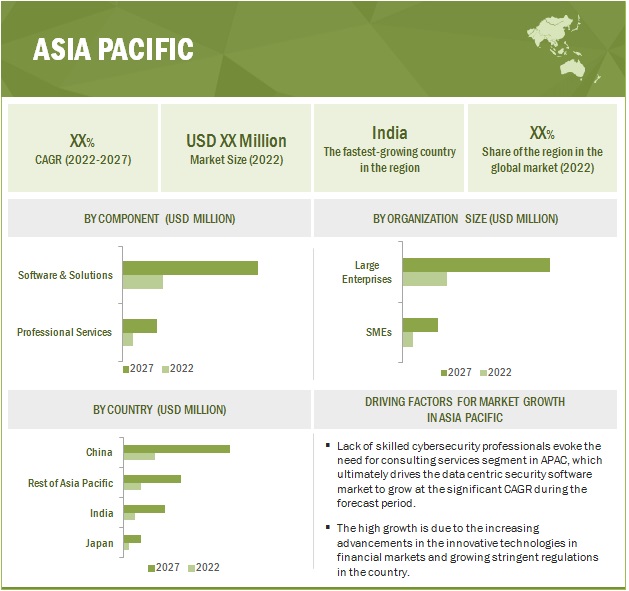< Key Hightlight >
The global Data-centric Security market size is expected to grow from USD 3.5 billion in 2020 to USD 9.8 billion by 2026, at a Compound Annual Growth Rate (CAGR) of 23.1% during the forecast period. The major factors driving the data-centric security market include increasing demand for data-centric security solutions for cloud-based data security, stringent compliances and regulations, and increasing risk on enterprise data due to exploitation of big data analytics, Machine Learning (ML), and Artificial Intelligence (AI) technology. On the other hand, organization’s tolerance for inconvenience and security breaches due to internal vulnerabilities is hindering the growth of the data-centric security market, globally. Furthermore, enterprise budgetary concerns, and lack of awareness toward data-centric security solutions are the major challenges faced by market vendors.

To know about the assumptions considered for the study, Request for Free Sample Report
With the increasing pace of information created on a daily basis, enterprises generate huge volumes of data in structured, semi-structured, and unstructured formats. As a result, they are increasingly traversing toward digitalization and are shifting their focus in the direction of data-centric security. Data-centric security solutions provide a comprehensive way to protect enterprises data compliance and privacy. These solutions can be applied to data at rest, data in transit, and data in use and can involve several processes, such as data classification and discovery, data protection via encryption, tokenization and masking, and data governance and compliance. These solutions are concerned about the privacy and security of data rather than the security of networks, endpoints, and applications. Furthermore, the growing instances of cyberattacks are making data-centric security solutions an essential element in the organizations to protect mission-critical data. The global data-centric security market is in the growth stage and is expected to witness expansive growth prospects owing to increasing concerns of data security among end-users.
Covid-19 Impact
The COVID-19 pandemic has revolutionized the use of digital technology and remote working principles. Almost every industry is now working virtually with the help of remote networking. This “new normal” working environment makes it essential for enterprises to move their assets on the cloud and digital platforms, by taking appropriate security measures such as network security, perimeter security, during the pandemic, leading to a rise in the number of data breaches. According to NBC, “33,000 unemployment applicants were exposed to a data security breach from the Pandemic Unemployment Assistance program in May 2020”, and according to Atlasvpn, “Americans lost more than USD 97.39 million to COVID-19 and stimulus check scams. These statistics shows that protecting data from players outside i.e. perimeter security or network security, is not enough. Software and solutions that can secure the data despite its location, are the need of the market during and in the post-pandemic period.
Market Dynamics
Driver: Increasing demand for data-centric security solutions for cloud-based data security
Data is growing faster and free to flow anywhere and everywhere in the cloud as needed by an increasingly mobile workforce. In 2020, companies such as IBM, Microsoft, and Google dominated the cloud market and implemented various advanced technologies, such as AI and ML, to analyze data. The operation of these large volumes of data to get their insights in real time presents new challenges and opportunities for future cloud infrastructure. A 2018 survey by IDG, a leading technology media company, stated that 73% of companies had applications or infrastructure in the cloud, with another 17% expected to make a move in the coming year. Large and small enterprises increasing need to protect data on the cloud is expected to drive the data-centric security market. For instance, Informatica provides Intelligent Cloud ServicesSM, which provides data protection in the form of failover data centers, user authentication, and access controls, encryption at the operating system, database, and application levels. According to Informatica, around 85% of the organizations believe that the ability to limit the data's access to only those who require data and to whom the data is shared is the most critical capability of data-centric security.
Restraint: Organization’s tolerance for inconvenience and security breaches due to internal vulnerabilities
Data is growing faster and free to flow anywhere and everywhere in the cloud as needed by an increasingly mobile workforce. In 2020, companies such as IBM, Microsoft, and Google dominated the cloud market and implemented various advanced technologies, such as AI and ML, to analyze data. The operation of these large volumes of data to get their insights in real time presents new challenges and opportunities for future cloud infrastructure. A 2018 survey by IDG, a leading technology media company, stated that 73% of companies had applications or infrastructure in the cloud, with another 17% expected to make a move in the coming year. Large and small enterprises increasing need to protect data on the cloud is expected to drive the data-centric security market. For instance, Informatica provides Intelligent Cloud ServicesSM, which provides data protection in the form of failover data centers, user authentication, and access controls, encryption at the operating system, database, and application levels. According to Informatica, around 85% of the organizations believe that the ability to limit the data's access to only those who require data and to whom the data is shared is the most critical capability of data-centric security.
Opportunity: Increasing data breaches cases provide more opportunities to data-centric security vendors
Despite having large investments in privacy-related infrastructure and data protection, critical data is still vulnerable. According to Informatica, in 2019, the company noted over 5,000 data breaches with nearly 8 billion records exposed. Furthermore, according to Trend Micro, a quarter of all organizations in the last year faced severe cyberattacks. According to their survey, 83% of the people believe that those attacks will be successful in the current years. One of the top areas the companies need to be concerned about is the data in the cloud. The increase in data breaches among the organization will lead to the adoption of data-centric security solutions in the upcoming years.
Data discovery and classification Software and solutions segment to have the highest market share during the forecast period
Data discovery and classification is the primary and most crucial phase of data-centric security. The term refers to discovering and classifying sensitive and important data from the set of scattered data sets available on multiple locations of an enterprise. Data inventory, data identification and mapping, data catalog and data validation are some of the similar terms considered under data discovery and classification. Data discovery and classification tools help enterprises and industry verticals to gain visibility into the location, volume, context, and risk associated with sensitive unstructured data available on both platforms, on-premises, and in the cloud. By discovering and classifying the relevant data, appropriate security and control measures can be applied, to safeguard them from internal and external factors.
Healthcare and Pharmaceuticals vertical to grow with the fastest growing CAGR during the forecast period
The healthcare vertical covers personal health information and critical data about a patient that needs high security; therefore, data security has been of utmost importance to this vertical. The growing need to safeguard the internal healthcare data of an organization is also of utmost importance since most healthcare organizations focus on customer data protection and do not focus on the protection of the internal data. The implementation of regulatory compliances, such as HIPAA, helps secure sensitive data, protect the identities by providing a digital signature, protect network gateways and databases. With the increasing instances of medical record thefts and awareness of the regulatory compliances, the adoption rate of data-centric security solutions and service is expected to be on the rise in the coming years.
Asia Pacific market to grow with the fastest growing CAGR during the forecast period
APAC has specifically been one of the fastest-growing markets in terms of mobile workforce expansion, propagated with the rising adoption of mobile devices in this region. Enterprises and SMEs in the APAC countries are admitting the significance of data-centric security and are receptive to adopting dedicated data-centric security solutions to protect their critical and sensitive business data from commercial espionage, cyber threats, and misuse of data for monetary gains of the computer hackers. APAC countries such as Australia, China, and Japan have widely adopted encryption technologies to protect data from being stolen. The popular APAC countries, such as Singapore and India, are now gradually advancing toward adopting superior data-centric security solutions.

To know about the assumptions considered for the study, download the pdf brochure
Key Market Players
Major vendors in the global Data-centric Security market include Informatica (US), NetApp (US), IBM (US), Broadcom (US), Microfocus (US), Varonis Systems (US), Talend (US), OrangeCyberdefense (France), Forcepoint (US), Imperva (US), PKWARE (US), Seclore (US), Fasoo (South Korea), Protegrity (US), Egnyte (US), Netwrix (US), Digital Guardian (US), Securiti (US), HelpSystems (US), BIGID (US), Lepide (US), NextLabs (US), SealPath (Spain), Nucleus Cyber (archTis) (US), Secupi (US), Dathena (Singapore), Infogix (US), and Concentric.ai (US).
Lepide:
Lepide is a global provider of data security solutions. It helps some of the world’s largest enterprises improve data protection, meet compliance, and detect/react to threats through the Data Security Platform. The data security platform helps in the location and classification of sensitive data, governing access, and track permission changes, analyzing user behaviour to spot anomalies, and much more. It also detects a wide range of threats, from ransomware to rogue insiders, and alerts and responds automatically in real-time. It also reduces the attack surface by identifying privileged users and implementing zero trust. The company’s solution further maintains compliance that is 70x faster with pre-configured reports.
Lepide focuses primarily in assisting its clients in data discovery and classification. Its platform also assists client s with various compliances and standards such as GDPR, CCPA, HIPAA, PCI DSS and others. The Lepide data security platform can be integrated with SharePoint, Office365, G Suite, Amazon S3, Dropbox, File Server, and others.
Scope of Report
Report Metrics | Details |
Market size available for years | 2015-2026 |
Base year considered | 2020 |
Forecast period | 2021-2026 |
Forecast units | Value (USD) |
Segments covered | Component, Deployment, Organization Size, Verticals, and Region |
Regions covered | North America, Europe, APAC, MEA, and Latin America |
Companies covered | Informatica(US), IBM(US), Broadcom (US), Microfocus (US), Varonis System (US), Talend (US), Orange Cyberdefense(France), Forcepoint (US), Imperva (US), NetApp (US), Infogix(US), PKWARE(US), Seclore(US), Fasoo (South Korea), Protegrity (US), Egnyte (US), Netwrix (US), Digital Guardian (US), Help Systems (US), BigID(US), Securiti (US), Secupi (US), Concentric.AI (US), Lepide (US), NextLabs (US), SealPath (Spain), Nucleus Cyber (US), Dathena(Singapore). |
This research report categorizes the data-centric security market to forecast revenue and analyze trends in each of the following submarkets:
Based on the Component:
- Software and Solutions
- Data discovery and classification
- Data protection
- Data governance and compliance
- Others (incl. DLP, and data tagging and watermarking)
- Professional Services
Based on the Deployment mode:
Based on organization size:
- Small and Medium-sized Enterprises (SMEs)
- Large Enterprises
Based on verticals:
- Banking, Financial, Services, and Insurance (BFSI)
- Government and Defense
- Healthcare and Pharmaceuticals
- IT and Enterprises
- Telecommunciation
- Retail
- Others (Incl. Energy, manufacturing, gaming and gambling, media and education)
Based on regions:
- North America
- Europe
- UK
- Germany
- France
- Rest of Europe
- APAC
- China
- Japan
- India
- Rest of APAC
- MEA
- UAE
- South Africa
- Rest of MEA
- Latin America
- Brazil
- Mexico
- Rest of Latin America
Key development:
- In March 2021, Lepide upgraded its Data security platform version 21.1 emphasized on helping organization with their unstructured data sets. The benefits of new version includes priority based scaling, affordable implementation cost and unparalled flexibility.
- In February 2021, Lepdie partnership with Atakama for data protection. With this partnership, Lepide customers would be able to protect their sensitive data in hybrid enviornment and secure it with AES 256-bit encryption.




